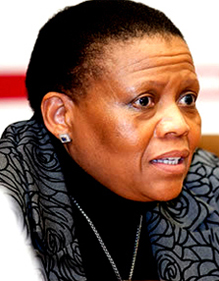
Recently, the spotlight has been on two pillars of our democracy, the Independent Electoral Commission (IEC) and the Office of the Public Protector. At the heart of the fight is a contract entered into by the IEC, now Chaired by Advocate Pansy Tlakula, and Abland (Pty) Ltd for the lease of the IEC’s headquarters in Centurion.
The Public Protector’s comprehensive report follows a complaint alleging that the IEC-Abland lease agreement had been entered into irregularly. This sparked an exhaustive investigation, including interviews, scrutiny of documents and analysis of applicable legal provisions and frameworks including King III and the Public Service Commission’s report on Managing Conflicts of Interest in the public sector.
The investigation found that the IEC’s then Chief Electoral Officer (and current Chair), Advocate Tlakula, failed, in the procurement of new leased premises for the IEC, to disclose her business relationship with Thaba Mufamadi, Chairperson of Manaka Property Investments. Manaka owns a 20% share in Abland – the entity that was awarded the lucrative lease agreement with the IEC. Tlakula and Mufamadi are co-directors in another company, Lehotsa Investment Holdings.
The Public Protector found Tlakula’s failure to disclose this relationship to be an “undisclosed and unmanaged conflict of interest”. Although the Public Protector found too that all the members of the Commission’s executive committee (exco) failed to disclose their interests prior to participating in the adjudication and award of the contract, Tlakula’s involvement goes deeper. The report finds that Tlakula was highly involved in the initiation, evaluation and adjudication of the bids for the procurement of the building, in contravention of a number of statutes.
Are we surprised by this impugned conduct? Unfortunately, not. Each week Corruption Watch receives countless reports from the public alleging conflicts of interests in public procurement. This week, we are investigating a contract awarded by a provincial health department to a private entity owned by the spouse of a department employee. No competitive public bidding process preceded the award of the contract. While the facts of the IEC lease debacle are distinguishable from our “spousal conflict case” on many grounds, the disregard of the rules is common.
Two particular questions however arise here: should Tlakula be held to a higher standard given her role in an institution that is, and must be seen to be, a bastion of democracy? And why has Tlakula responded in the manner she has to the Public Protector’s findings?
The press last week conveyed Tlakula’s response to the Public Protector’s probe as being centred on her supposed lack of financial gain from the award of the contract. Tlakula is quoted as saying that she couldn’t have breached a policy as she made no financial gain; that no public funds were misappropriated and no benefit was received by her. Or put differently by one online paper: Tlakula has questioned whether a conflict arises in the absence of financial gain.
Tlakula’s response misses the point. Our Constitution requires that public procurement must be fair, equitable, transparent, cost-effective and competitive. Whether or not Tlakula had a financial interest in the deal is not determinative of whether these principles, and in particular, fairness, was undermined or disregarded. The Public Protector’s report crisply captures our view on this: “things that undermine objectivity, transcend financial interests”.
But whether or not this convinces you, and whether or not you believe in holding the IEC and its leadership to higher standards, there is a more clear-cut argument here, grounded in the legal framework that was put in place precisely to avoid such situations and to ensure a level playing field.
The IEC’s exco approved a request for proposal in respect of the building in violation of its Procurement Policy; the request for proposal didn’t comply with the Treasury Regulations; the advert for request for proposals violated the Commission’s policy; the bid was open for an improper amount of time and an addendum to the lease was entered into for the provision of a turnkey solution, in an irregular manner. Simply put, rules were broken.
These contraventions of the law and the Commission’s own procurement policy, of which we have named but a few, coupled with the undisclosed conflict of interest, make Tlakula’s response to the Public Protector’s probe unacceptable.
The argument of “but I didn’t benefit financially” is not sufficient. From the public procurement complaints that we receive we have learnt two key lessons: play by the rules and respect the spirit of the rules. Tlakula appears to have done neither.
The question that is left hanging is “why were these straightforward rules which have been followed on countless previous occasions broken?” Absent an answer the reasonable inference is that Tlakula chose to follow her undisclosed interest.
Nicola Whittaker is head of legal and investigations at Corruption Watch.

